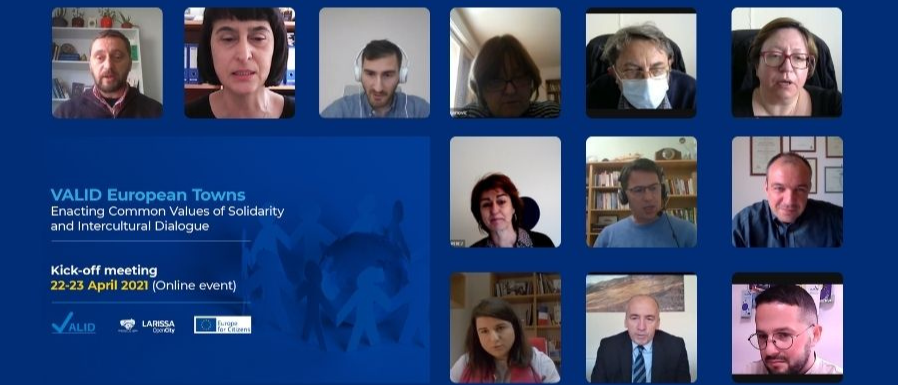Thursday and Friday the 22nd and the 23rd of April were two meaningful days for the online introduction of the project VALID – European Towns – Enacting Common Values of Solidarity and Intercultural Dialogue. This two-days online event was organised by the municipality of Larissa (Greece) together with various stakeholders placed at different level:
- The municipality of Peja (Kosovo*) as the lead partner;
- The municipalities of Zadivovici (Bosnia and Hezergovina), Niksic (Montenegro), Knjazevac (Serbia), Patos (Albania), Kumanovo (North Macedonia);
- The cities of Ravenna (Italy), Larissa (Greece);
- The Association for Developing Voluntary Work Novo Mesto (Slovenia); and
- The Local Democracy Agencies such LDA Kosovo and LDA Subotica and ALDA, as partners of the project.
The main objective of the project, as M. George Soultis said during the first meeting, “is to build connections between European cities”. Indeed, the VALID project aims to build a strong network of towns committed to intercultural exchange by using dialogue and open spaces through the promotion of cultural participation and civil society in decision-making. This strong network of cities was thought as a way to build bridges and connections while establishing a common legal frame.
Moreover, this international event offered an opportunity to reflect on different European matters such as, for example, on candidates to the EU adhesion. Additionally, it was the occasion to share experiences and knowledge about certain facts that might inspire other stakeholders; empathising – among other things – on the role of cities and municipalities in the establishment of a well-functioning democratic society; by insisting on the idea that changes can be made at the local level.
The principle of local participation is a key factor in making sustainable cities in the future
Over these two days of cultural interaction and discussion, a lot of speakers got involved and shared their visions and progresses made at their own level: the principle of local participation is a key factor in making sustainable cities in the future. Hence, speakers underlined the necessity to facilitate interactions between the local governments and stakeholders coming from the civic society. The example of the municipality of Larissa showed as a successful story, encouraging and giving inspiration to other participants.
As the different speakers were sharing their experiences, the conversation lead to a couple of reflections on social inclusion, such as:
- It goes before cultural inclusion;
- It has to do with social identity which in some countries can lead to exclusion due to different opinion, religion, sexual orientation, or ethnicity;
- Despite the fact that inclusion should belong to a moral consideration, societies would actually benefit from a clear process of inclusion as it would generate economical assets.
Furthermore, the event served as a moment of discussion also as far as the multi-stakeholder approach within a project concerns. More in depths, it will quite often be a beneficial practice, especially when it comes to countries motivated by the same outcome. Yet, education, work, or school but more importantly, local governments could play a key part by implementing functioning tools to avoid discrimination – be it exclusion of some people due to their origin, ethnicity, race, or belief.
At last, the level of transparency and of public consultation was also addressed. As a matter of fact, young people have shown a high level of interest in political actions, making them potential “change promoters”, who will present a positive impact on decision-making process.
Concluding, this project is placing intercultural dialogue and exchange at the heart of it and aims to address exclusion and marginalisation while giving power to the citizens.
***
VALID project engages 12 partners in 10 countries and it is financially supported by the Europe for Citizens programme
